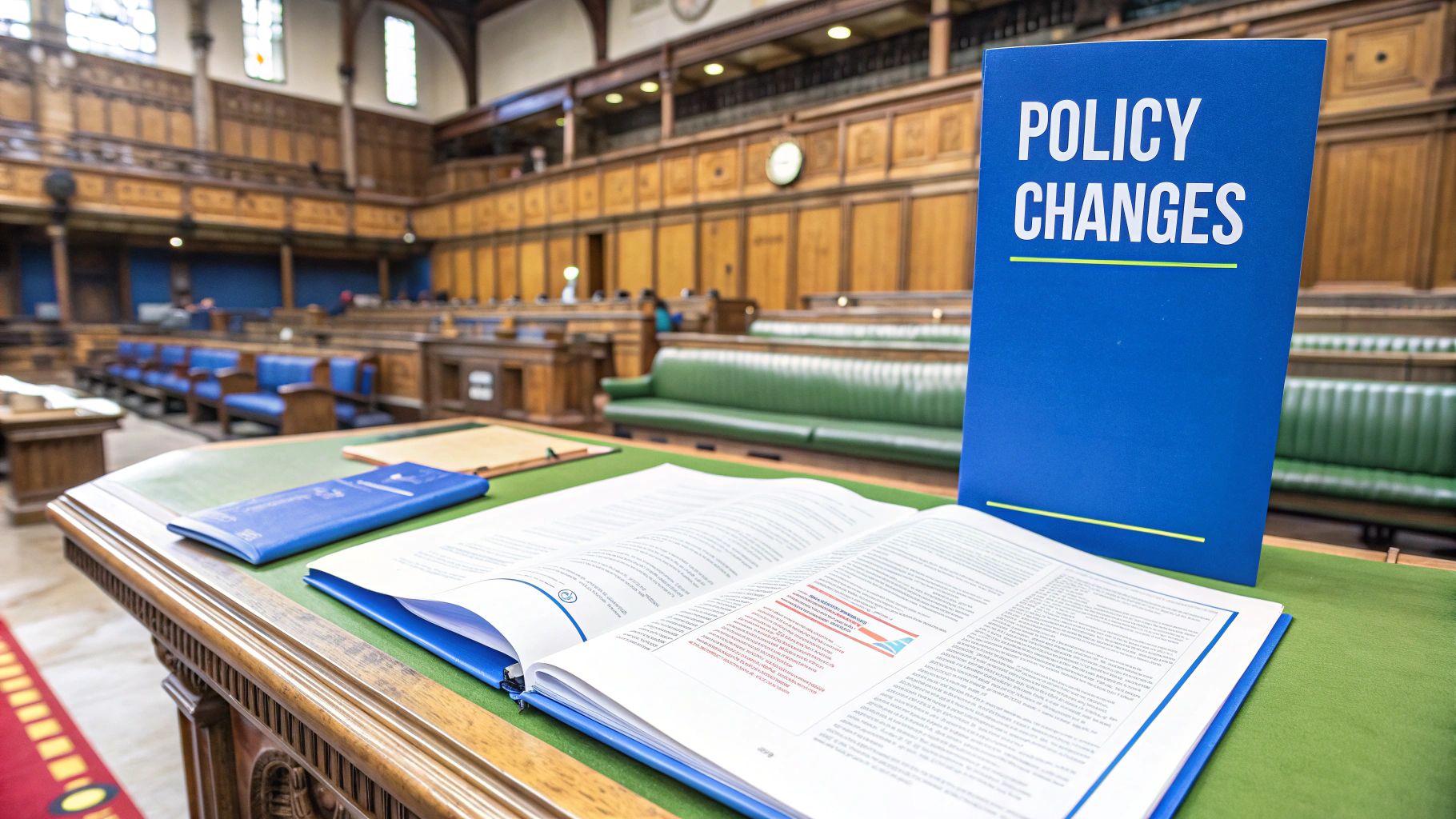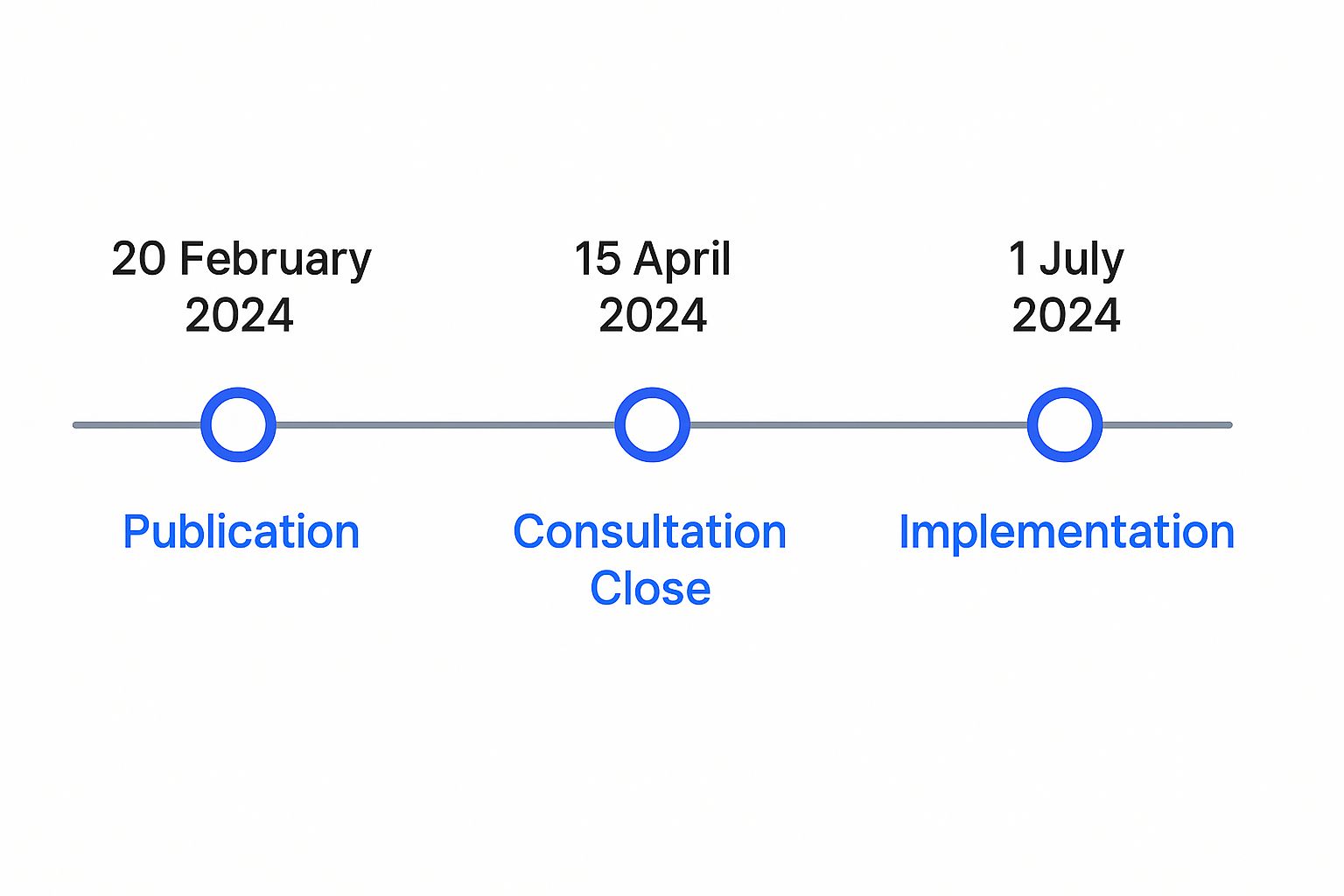New UK Immigration White Paper: What Every Nigerian Should Know

Navigating the New UK Immigration Landscape
The new UK immigration white paper marks a significant change in how Nigerians can access opportunities in Britain. Understanding the strategy behind these policy changes is essential for Nigerian nationals planning their future abroad. This section provides a foundational overview of the new landscape, preparing you for a more detailed examination of specific areas later on.
The UK’s evolving immigration policies reflect a global trend of nations reevaluating their approach to migration. These changes aim to create a more controlled and selective system, prioritizing skilled workers and those meeting specific requirements. This has major implications for Nigerians seeking to work, study, or live in the UK. For instance, the new points-based system emphasizes qualifications, experience, and English language proficiency.
This shift requires a strategic approach. Understanding the nuances of the new system is paramount. In 2024, approximately 52,000 Nigerians relocated to the UK for work and study. Of these, 27,000 arrived on work-related visas and 22,000 on study visas, demonstrating the substantial flow of Nigerian talent to the UK. Find more detailed statistics here. This influx underscores the importance of adapting to the new immigration framework.
Understanding the Core Principles of the White Paper
The white paper is built around several core principles that Nigerian applicants should understand:
A Points-Based System: This system assigns points for various factors, including qualifications, salary, and English language abilities. Reaching a specific point threshold is essential for visa eligibility.
Emphasis on Skilled Workers: The UK is actively seeking individuals with skills and experience that benefit its economy. Demonstrating your value is now more critical than ever.
Stricter Enforcement: The new policies also indicate a commitment to tighter border controls and stricter enforcement of immigration laws. Meticulous preparation and adherence to all regulations are necessary.
What This Means for Nigerians
These changes represent both opportunities and challenges. While some pathways may become more competitive, others may create new avenues. Carefully assess your individual circumstances and goals. Understanding the requirements for each visa category is crucial for a successful application.
The following sections explore specific aspects of the new UK immigration white paper and their direct impact on Nigerians. This includes detailed guidance on work visas, student visas, family reunification, and settlement strategies. By understanding the overall landscape, you’ll be better prepared to navigate the specifics and make informed choices about your future in the UK.
Professional Pathways: Work Visa Transformations
The new UK immigration white paper presents a changed environment for Nigerian professionals hoping to work in Britain. This new points-based system significantly alters how the UK approaches work migration, requiring a thorough understanding of its complexities. This section explains how your Nigerian qualifications and experience fit within this system, highlighting both the benefits and obstacles it may present.
Understanding the Points-Based System and Its Impact on Nigerians
The points-based system evaluates applicants based on factors such as qualifications, anticipated salary, and English language proficiency. This means Nigerian professionals must strategically present their skills and experience to meet the necessary requirements. Specific salary thresholds are critical; understanding these benchmarks for your desired profession is essential.
For example, some roles in high-demand sectors may have lower salary requirements than others. Check out our guide on How to master the new UK immigration requirements for workers.
Knowing which Nigerian credentials are automatically recognized in the UK streamlines the application process. This can save significant time and resources, allowing you to focus on other critical application aspects. However, UK net migration has been greatly influenced by policy adjustments and global events.
Net migration in the year ending June 2024 reached 728,000, largely due to increased non-EU citizens arriving in the UK. The subsequent decrease to 431,000 by the end of December 2024 reflects a broader trend of reduced immigration influenced by several factors, including fewer arrivals on work and study visas. Learn more about long-term international migration flows here.
Sponsorship and Sector Opportunities
Sponsorship is a cornerstone of the new framework. Understanding how to secure sponsorship from a UK employer is vital for a successful visa application. This involves showcasing your skills effectively and demonstrating your value to potential sponsors. Navigating the new UK immigration landscape requires understanding various regulations, much like understanding the requirements for operating a drone. You may find Drone License Requirements a useful comparison to this intricate process.
Identifying sectors with abundant opportunities for Nigerian talent increases your chances of securing a visa. Sectors experiencing skills shortages are often more open to international applicants, offering a strategic advantage. This could include fields like healthcare, technology, or engineering, but research is crucial for identifying current demand.

The following table provides a comparison of various UK work visa categories available to Nigerian professionals:
UK Work Visa Categories Comparison
This table compares the different work visa categories available to Nigerian professionals under the new immigration system.
| Visa Type | Eligibility Requirements | Duration | Path to Settlement | Cost |
|---|---|---|---|---|
| Skilled Worker Visa | Job offer from a licensed sponsor, minimum skill level, minimum salary, English language proficiency | Up to 5 years | Yes, after 5 years | Varies |
| Global Talent Visa | Exceptional talent or promise in a specific field | Up to 5 years | Yes, after 3 or 5 years | Varies |
| Health and Care Visa | Job offer from an approved NHS employer or social care organisation | Up to 5 years | Yes, after 5 years | Varies |
| Intra-Company Transfer Visa | Transferring from an overseas branch of a multinational company to a UK branch | Varies | No, unless switching to another visa category | Varies |
| Graduate Visa | Recent graduate from a UK university | 2 years (3 years for PhD graduates) | No, unless switching to another visa category | Varies |
This table summarizes key characteristics of some of the most common visa routes, highlighting the different requirements and potential outcomes. The cost and specific eligibility requirements vary based on individual circumstances and the chosen visa category. Further research into each specific visa type is highly recommended.
Practical Guidance for Nigerian Professionals
Both experienced professionals and early-career Nigerians seeking UK work experience can benefit from tailored approaches. For seasoned professionals, demonstrating a strong track record and pertinent experience is crucial. Early-career individuals can highlight their potential for growth and adaptability. English proficiency requirements apply to all applicants.
Demonstrating strong English language skills strengthens your application and is vital for effective communication in the UK workplace. By understanding these changes and taking a proactive approach, Nigerian professionals can successfully navigate the new UK immigration white paper and access opportunities in Britain. Thorough preparation and strategic planning are essential for achieving your career aspirations in the UK.
Academic Opportunities: From Student Visa to Career Launch
Nigerian students hoping to study in the UK are encountering a new landscape of opportunities and challenges under the recently implemented UK immigration white paper. This new framework significantly alters the student journey, from initial university acceptance all the way to post-graduation career prospects. This section explores how these changes impact Nigerian students, offering crucial guidance for navigating this evolving system.
Financial Requirements and Credibility Interviews
A key element of the new system is understanding the specific financial requirements for studying in the UK. These requirements can differ based on the institution type, program duration, and your individual circumstances. Demonstrating your ability to meet these financial obligations is essential for a successful visa application.
Credibility interviews are also playing an increasingly important role. These interviews are designed to evaluate your genuine intention to study in the UK. Thorough preparation is essential for a positive outcome. Clearly articulating your academic goals and demonstrating a strong understanding of your chosen program will greatly enhance your chances of success. For further insights, you may find this helpful: How to master the new UK immigration requirements for students.
The Graduate Route and Post-Study Work Opportunities
The Graduate Route presents a significant benefit for Nigerian students. This route allows graduates to stay in the UK for a designated period after graduation to acquire valuable work experience. It effectively creates a bridge between your Nigerian education and the UK professional environment, offering excellent opportunities for career advancement. Strategic planning and a proactive approach to job searching are key to maximizing this valuable opportunity.
Support for Students and Parents: Guardian Visas and Scholarships
The new immigration framework also provides clarity on guardian visa options for parents supporting their children’s education in the UK. This allows parents, especially those of younger students, to accompany their children and provide essential support during their time abroad.
A variety of scholarship pathways are available specifically for Nigerian students. These scholarships, some less well-known with higher acceptance rates, can considerably reduce the financial burden of studying in the UK. Researching and applying for these scholarships is a crucial step in planning your educational journey.

Strategic Planning for Long-Term Success
Successfully navigating the new UK immigration system requires proactive planning and a well-informed approach. Understanding the specific requirements, preparing diligently for credibility interviews, and exploring available funding opportunities are critical steps. By addressing these factors strategically, Nigerian students can maximize their potential for academic and career success in the UK. While the new white paper presents certain challenges, it also creates opportunities for those prepared to navigate the system effectively. This involves not only understanding the current rules but also anticipating future policy changes and adapting your strategies accordingly.
Bringing Your Family: Navigating Reunification Routes
Family separation is a difficult part of relocating abroad. This section offers guidance for Nigerians hoping to reunite with their families in the UK under the new immigration system outlined in the new UK immigration white paper. It’s essential to understand that this process requires careful planning and a thorough understanding of the current regulations.

The infographic above highlights key dates related to the new UK immigration white paper, from its initial publication to the enforcement of the new rules. This emphasizes the importance of understanding deadlines as you plan your family reunification.
Income Thresholds and Demonstrating Genuine Relationships
One of the most critical aspects of the new system is meeting the income thresholds for sponsoring spouses and children. These financial requirements ensure sponsors can support their family in the UK. The new UK immigration white paper offers ways to meet these requirements.
Combining income with savings, for instance, can help reach the necessary threshold. Demonstrating a genuine relationship is also crucial. This can be challenging, considering Nigeria’s documentation systems. However, understanding the type of evidence UK decision-makers value increases your chances of success.
Clear and consistent communication, joint finances, and supporting letters from family and friends in Nigeria can strengthen your application.
Elderly Parents and Adult Dependents
The new UK immigration white paper also addresses reuniting elderly parents and adult dependents. Specific criteria and exceptional circumstances can be used to support these applications. For instance, demonstrating a genuine need for long-term care is important.
Showcasing a need for critical support unavailable in Nigeria can also be a deciding factor. These details help paint a clearer picture of the applicant’s circumstances.
Strategic Timing and Maintaining Legal Status
Finally, the timing of applications and maintaining legal status are crucial. Submitting applications before deadlines and meeting all visa conditions will minimize delays and potential problems. This requires a deep understanding of all relevant regulations.
By approaching family reunification strategically and adhering to the guidelines in the new UK immigration white paper, Nigerians can improve their chances of a positive outcome. It’s recommended to consult with an immigration specialist for personalized guidance.
Building Your British Future: Settlement Strategies
For Nigerians considering a permanent move to the UK, the new UK immigration white paper presents a redefined path to settlement. This section explores how different visa categories impact your journey toward Indefinite Leave to Remain (ILR) and offers valuable guidance on maximizing your qualifying period. We’ll cover practical strategies for managing absences while maintaining your connections to Nigeria, offer a Nigerian perspective on navigating the Life in the UK test, and explain how to create a strong application portfolio.
Understanding Your Pathway to ILR
Your journey to settling in the UK starts with understanding your visa category and its specific requirements. Each visa type has specific conditions related to the length of stay needed for ILR eligibility. For example, the Skilled Worker Visa typically requires five years of continuous residence, while other visa routes may have different timelines. For more information, see our comprehensive guide on the new UK immigration white paper. Precisely tracking your qualifying period is crucial for ensuring you meet the necessary requirements when you apply for settled status. Maintaining detailed records of your entry and exit dates, along with any periods of absence, is essential for a successful application.
Managing Absences and Maintaining Nigerian Connections
A key aspect of qualifying for ILR is adhering to the absence limitations set by your visa. While staying connected to Nigeria is important, exceeding the allowed absence periods can impact your eligibility for settled status. Careful planning and strategic management of your trips back home are therefore necessary. Understanding the 180-day rule and its implications for your specific visa category can help avoid potential issues.
Mastering the Life in the UK Test and Building Your Evidence Portfolio
The Life in the UK Test is a vital part of the settlement process. Preparing for this test from a Nigerian perspective involves understanding its format, key content areas, and addressing common misconceptions. Using practice materials tailored for Nigerians can significantly increase your chances of passing.
Beyond the Life in the UK test, compiling a comprehensive evidence portfolio is essential. This means providing documented evidence of your continuous residence, financial stability, and integration into British society. This might include proof of paying taxes, participating in community activities, and maintaining a stable UK address.
Dual Citizenship and Tax Implications
For Nigerians with dual citizenship, navigating the complexities of both Nigerian and British nationality is important. Understanding the tax implications and practical considerations associated with dual citizenship is key for making informed decisions about your long-term immigration strategy. This includes awareness of potential tax obligations in both countries and any impact on eligibility for government benefits.
Understanding Your Rights and Making Informed Decisions
Different immigration statuses grant varying rights and privileges. Understanding what each status level offers allows you to make informed decisions about your long-term goals. For example, ILR grants the right to live and work in the UK indefinitely, while British citizenship provides additional rights, like voting and holding a British passport. By carefully considering your personal circumstances and aspirations, you can develop a tailored settlement strategy.
To help visualize the different pathways, the table below provides a general overview of timelines and requirements:
Settlement Pathways Timeline
This table outlines the various pathways and timelines to permanent residence and citizenship available to Nigerians under different visa categories
| Entry Visa Type | Years to ILR Eligibility | Additional Requirements | Years to Citizenship Eligibility | Total Minimum Cost |
|---|---|---|---|---|
| Skilled Worker Visa | 5 | Continuous residence, Life in the UK test, English language proficiency | 1 | Varies |
| Spouse Visa | 5 | Continuous residence, Life in the UK test, English language proficiency | 1 | Varies |
| Investor Visa | 2-5 (depending on investment amount) | Continuous residence, Life in the UK test, English language proficiency | 1 | Varies depending on investment |
It’s important to remember that these timelines and requirements can vary depending on individual circumstances. Further research and consultation with an immigration advisor are recommended for personalized guidance.
Healthcare Navigation: Accessing Medical Services
Understanding the UK healthcare system is crucial for Nigerian migrants’ well-being and financial security. This is especially important considering the new UK immigration white paper. This section explains how the Immigration Health Surcharge (IHS) affects visa costs and what services it covers. We’ll also explore practical steps for accessing healthcare in the UK.

The Immigration Health Surcharge: What It Is and What It Covers
The IHS is a mandatory fee paid upfront during the visa application process. This charge grants access to the National Health Service (NHS), the UK’s publicly funded healthcare system. The new UK immigration white paper maintains this requirement. Understanding its impact on total immigration costs is essential.
The IHS covers most NHS services, including:
- GP appointments
- Hospital treatments
- Emergency care
Some services, such as dental care and prescriptions, may incur additional fees. This is similar to out-of-pocket expenses sometimes required in Nigeria, even with health insurance.
Registering With a GP and Managing Pre-Existing Conditions
After arriving in the UK, registering with a General Practitioner (GP) is vital. Your GP serves as the primary contact for all healthcare needs. They can provide referrals to specialists or hospitals when necessary. The registration process involves finding a local GP practice and completing the required forms.
Managing pre-existing conditions within the NHS requires proactive communication with your GP. Inform them about your medical history and any current medications. They can then coordinate ongoing care and ensure appropriate treatment.
Navigating Emergency Care and Transferring Medical Records
In emergencies, dial 999 for ambulance services, much like dialing emergency numbers in Nigeria. For less urgent situations, consider visiting NHS walk-in centres or contacting NHS 111 for guidance.
Transferring Nigerian medical records to the UK can be beneficial for continuity of care. While not mandatory, providing your GP with your medical history can help them provide the most suitable care.
National Insurance and Private Healthcare Options
National Insurance (NI) contributions fund several UK social security programs, including the NHS. Paying NI is generally mandatory for those employed in the UK. These contributions strengthen your entitlement to NHS services.
While the NHS offers comprehensive coverage, some individuals opt for supplementary private healthcare insurance. This can provide quicker access to specific treatments or specialist care. Carefully consider the benefits of both systems to determine the best approach for your needs.
The new UK immigration white paper doesn’t change the basic structure of the NHS or private healthcare. However, its overall effect on access to public services, including healthcare, warrants careful consideration. Understanding these key components of the UK healthcare system allows Nigerian migrants to effectively navigate access to medical services and ensure their well-being in the UK.
Application Excellence: Avoiding Common Nigerian Pitfalls
Success in the UK immigration system demands strategic preparation, particularly with the new UK immigration white paper in effect. This section provides helpful advice specifically for Nigerians, tackling common issues that could impact your application. We’ll cover efficient document preparation, addressing employment or education gaps, and outlining ways to demonstrate financial stability and successful interview techniques.
Document Preparation: Addressing UK Concerns About Nigerian Credentials
UK decision-makers often closely examine Nigerian documents. Precise document preparation is therefore essential. Begin by ensuring all documents are original and legible. This includes educational certificates, birth certificates, and any applicable marriage certificates. Obtain official translations for any documents not originally issued in English.
The new UK immigration white paper underscores the significance of verified credentials. Follow these steps for proper verification and authentication:
Contact the Issuing Institution: Confirm the correct process for verifying your documents. This may involve requesting a certified copy or a verification letter from the original source.
Legalization and Apostille: Nigerian documents typically require legalization by the Ministry of Foreign Affairs and an Apostille stamp from the Hague Conference. This confirms document authenticity for international use.
Certified Translations: Use only certified and accurate translations. Inaccurate translations can severely hinder your application’s progress.
Addressing Gaps in Employment or Education
Gaps in your employment or education history are commonplace, but it’s important to address these transparently and thoroughly within your application. Provide clear, concise reasons for periods of unemployment or educational breaks. Supporting documents, such as letters from past employers or schools, will reinforce your explanations. For example, if you paused your career for family care, provide documentation that supports this.
Demonstrating Financial Stability Despite Nigeria’s Banking Complexities
Showing financial stability can be challenging for Nigerian applicants due to the nuances of Nigeria’s banking system. The UK immigration white paper outlines specific financial requirements, and a strategic approach is needed to satisfy these.
Consistent Bank Statements: Submit six months of bank statements demonstrating regular income and sufficient funds to support yourself (and any dependents) in the UK.
Source of Funds: Clearly document the origin of your funds. If you receive financial support from family, include documentation confirming this support.
Currency Conversions: Ensure all financial figures are presented in British Pounds Sterling (GBP) using the current exchange rate.
Interview Preparation: Addressing Misconceptions About Nigerian Applicants
The interview is a pivotal step in the process. Prepare to counteract any preconceived notions about Nigerian applicants by projecting a confident and professional demeanor. When navigating healthcare in the UK, managing your absence effectively is important, including setting up automatic replies, for instance, using these tips: Outlook Automatic Replies Out Of Office. Practice responding to common interview questions and emphasize your unique skills and qualifications. Demonstrating a solid grasp of the new UK immigration white paper and how it pertains to your application significantly strengthens your case.
Understanding Rejection Patterns and Maximizing Your Chances
Analyzing common rejection patterns offers insights into areas needing extra attention. Focus on strengthening any perceived weaknesses in your application and presenting your situation persuasively. By understanding the specific hurdles faced by Nigerian applicants and utilizing these strategies, you can significantly increase your chances of a successful outcome. Meticulous preparation is vital for navigating the UK immigration system and securing your future in Britain.
Ready to begin your journey? JapaChat, a leading AI immigration expert platform in Nigeria, offers personalized guidance and resources for Nigerians planning their relocation. Visit JapaChat today to see how we can help you confidently navigate the UK immigration process.

Leave a Reply